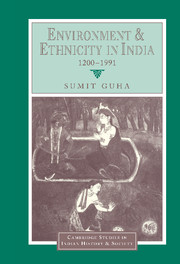Book contents
- Frontmatter
- Contents
- List of maps
- List of tables
- Acknowledgements
- Glossary
- List of abbreviations
- Introduction
- 1 From the archaeology of mind to the archaeology of matter
- 2 Subsistence and predation at the margins of cultivation
- 3 State formation in the highland forests 1350–1800
- 4 The peoples of the Sahyadri under Marathas and British
- 5 The central Indian forest from Mughal suzerainty to British control
- 6 The central Indian forest under early British rule
- 7 Identities and aspiration – not noble savage but savage noble
- 8 The high colonial period and after – new patterns of authority and power
- 9 From sanctuaries to safeguards: policies and politics in twentieth-century India
- Conclusion
- Afterword
- Bibliography
- Index
9 - From sanctuaries to safeguards: policies and politics in twentieth-century India
Published online by Cambridge University Press: 12 November 2009
- Frontmatter
- Contents
- List of maps
- List of tables
- Acknowledgements
- Glossary
- List of abbreviations
- Introduction
- 1 From the archaeology of mind to the archaeology of matter
- 2 Subsistence and predation at the margins of cultivation
- 3 State formation in the highland forests 1350–1800
- 4 The peoples of the Sahyadri under Marathas and British
- 5 The central Indian forest from Mughal suzerainty to British control
- 6 The central Indian forest under early British rule
- 7 Identities and aspiration – not noble savage but savage noble
- 8 The high colonial period and after – new patterns of authority and power
- 9 From sanctuaries to safeguards: policies and politics in twentieth-century India
- Conclusion
- Afterword
- Bibliography
- Index
Summary
Protective custody for infant races
In the previous chapter I argued that the latter half of the nineteenth century saw the colonial government embarking on policies of constructive conservation for both society and environment. I term it constructive because it aimed at reconstituting an order of things that was presumed to have existed at some time in the past, and not at freezing the current status quo. It was therefore distinctly interventionist, both ecologically and socially. The uprising of 1857 gave a strong impetus to social conservation, leading, most famously to a reversal of policy regarding the landlords of Awadh, but also (in our region) influencing policy towards groups such as the Gujarat talukdars. These men had been treated as mere leaseholders in the early decades of British rule, and their social decline viewed with equanimity. The explosion in 1857 changed the official outlook and, after some deliberation, the Bombay Government passed Act VI of 1862, giving them hereditary property rights. In order to prevent these being seized by their creditors, the Act provided for a state arbitration of their debts and the takeover of estates for a period of twenty years during which as much as possible of the debt would be paid off. Any debt remaining after two decades would be cancelled. This legislation represented a dramatic break with laissezfaire and unlimited protection of property rights.
- Type
- Chapter
- Information
- Environment and Ethnicity in India, 1200–1991 , pp. 182 - 198Publisher: Cambridge University PressPrint publication year: 1999

